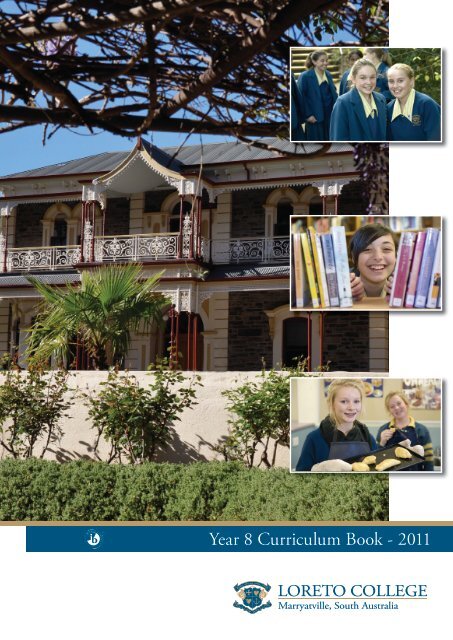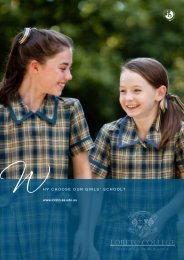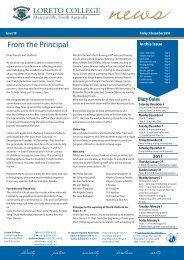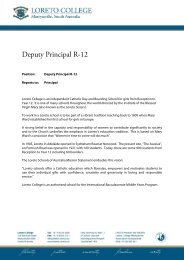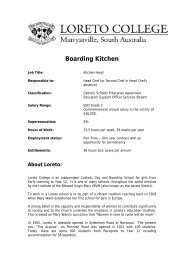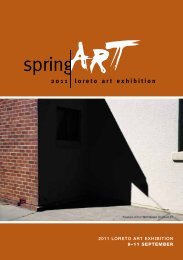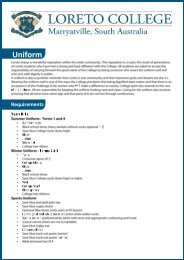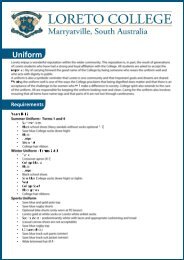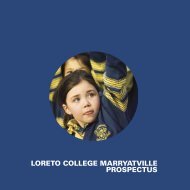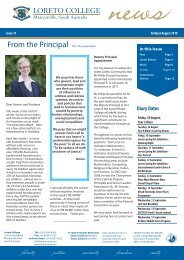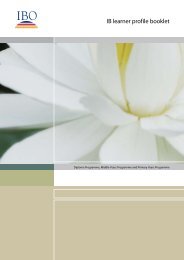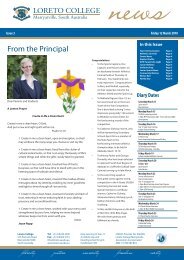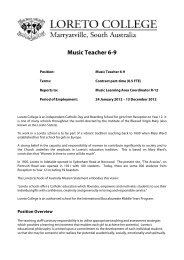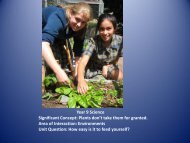Year 8 Curriculum Book - 2011 - Loreto College
Year 8 Curriculum Book - 2011 - Loreto College
Year 8 Curriculum Book - 2011 - Loreto College
Create successful ePaper yourself
Turn your PDF publications into a flip-book with our unique Google optimized e-Paper software.
<strong>Year</strong> 8 <strong>Curriculum</strong> <strong>Book</strong> - <strong>2011</strong>
Contents<br />
Introduction 2<br />
<strong>Loreto</strong> Education Philosophy 3<br />
Middle <strong>Year</strong>s Programme (MYP) 4<br />
Social Justice Passport 6<br />
<strong>Year</strong> 8 Overview 7<br />
Subject Criteria Overview 8<br />
Learning Area Pathways 9<br />
Art 17<br />
<strong>Curriculum</strong> Enrichment 18<br />
Drama 18<br />
Geography 19<br />
History 20<br />
Home Economics - Food & Textile Technology 21<br />
Language A 22<br />
English 22<br />
Language B 23<br />
Chinese 23<br />
English as a Second Language 24<br />
French 24<br />
Italian 25<br />
Mathematics 26<br />
Music 28<br />
Physical Education 29<br />
Religious Education 30<br />
Science 30<br />
U&ICT 32<br />
<strong>Year</strong> 8 Coordinator - Ms Janelle Morrissey<br />
Head Middle <strong>Year</strong>s - Ms Jane Omond
Introduction<br />
This booklet contains descriptions of subjects offered in <strong>2011</strong> for <strong>Year</strong> 8 students.<br />
Information is also included regarding the subject pathways in subsequent years.<br />
<strong>Loreto</strong> <strong>College</strong> offers a diverse range of subjects which prepares students both<br />
academically and personally for the challenges of the 21st Century. Courses of study in<br />
<strong>Year</strong> 8 are based on the eight Areas of Learning as described in the International<br />
Baccalaureate Middle <strong>Year</strong>s Programme (IBMYP). As a Catholic School, Religious Education<br />
is also an integral part of the curriculum.<br />
The IBMYP curriculum framework is underpinned by the five Areas of Interaction which<br />
enable students to view their world from different perspectives. Approaches to Learning,<br />
Environments, Community and Service, Human Ingenuity and Health and Social Education<br />
are the inquiry model through which units of work are developed and are woven into<br />
teaching across all curriculum areas. The range of options available to students broadens as<br />
they progress through the Middle <strong>Year</strong>s at the <strong>College</strong>, in preparation for study at SACE<br />
Stages 1 & 2. Please refer to the pathways for each area of learning to see the range of<br />
subjects offered in each year level.<br />
Every effort will be made to place students in their chosen subjects. However, due to class<br />
sizes, resources and staffing, sometimes this may not be possible.<br />
Students are encouraged to discuss choices at home and to seek advice and support from:<br />
Pastoral Care Teacher<br />
Subject Teachers<br />
<strong>Year</strong> 8 Level Coordinator – Ms J Morrissey<br />
Student Counsellor – Ms K Munro<br />
Careers Counsellor – Ms S Randell<br />
Middle <strong>Year</strong>s Programme Coordinator (MYP Coordinator) – Ms A Reid<br />
Head Middle <strong>Year</strong>s – Ms J Omond
<strong>Loreto</strong> Educational Philosophy<br />
“The Institute of the Blessed Virgin Mary was founded at the beginning of the 17th century<br />
by an English woman, Mary Ward, to serve the Church through education. The goals of our<br />
education today are in essence the same as the goals of our Foundress: the spiritual,<br />
intellectual and social development of the individual, and the preparation of students to<br />
take their place in the society in which they live, as well as to achieve their ultimate goal,<br />
the knowledge and love of God, in so far as this can be attained.<br />
The Christian person as envisaged by Mary Ward is characterised by:<br />
freedom of spirit<br />
justice<br />
integrity<br />
These ideals incorporating personal responsibility, responsiveness to God and others, and<br />
the search for truth optimise the yearnings of all peoples in every age. Being fundamental<br />
human values, they are particularly relevant in today's world where the dignity of the<br />
human person is threatened.<br />
In modern society, with its rapid change and scientific and technological advances, the<br />
most important issues to be raised are not in fact technological - they are issues of values,<br />
and the translation of these values into action. A recognition of our responsibilities is a<br />
necessary part of education. Our society is a pluralist one, with often conflicting attitudes to<br />
religion, morality, human rights and associated areas. Hence our education needs to<br />
involve the development of our ability to evaluate critically, and to make decisions based<br />
on informed judgement and Christian principles, decisions reflecting a faithful use of the<br />
freedom given to us by God.<br />
Our schools, through their climate, teacher-student relations and curriculum, aim to meet<br />
the spiritual, intellectual, psychological and social needs of each student, developing more<br />
fully the ability of each one to think objectively and responsibly, to value the search for<br />
truth, and to appreciate the dignity and value of the human person.”<br />
Australian Province of the Institute of the Blessed Virgin Mary
Middle <strong>Year</strong>s Programme (MYP)<br />
The International Baccalaureate Middle <strong>Year</strong>s Programme (IBMYP) is designed for students<br />
aged 11 to 16. This period is a particularly critical phase of personal and intellectual<br />
development and requires a programme that helps students participate actively and<br />
responsibly in a changing and increasingly interrelated world. Learning how to learn and<br />
how to evaluate information critically is a important as learning facts.<br />
What is the IBMYP?<br />
The IBMYP stands for the International<br />
Baccalaureate Middle <strong>Year</strong>s Programme. It<br />
is a course of study for students from <strong>Year</strong>s<br />
6 – 10 and is based upon eight subject<br />
groups or Areas of Learning. These subject<br />
groups are Language A (English), Language<br />
B (French, Chinese or Italian), Mathematics,<br />
Science, Humanities, The Arts (Music, Art or<br />
Drama), Technology and Physical<br />
Education. At <strong>Loreto</strong> <strong>College</strong> students also<br />
study Religion as part of the curriculum in<br />
the Middle <strong>Year</strong>s.<br />
Image from www.ibo.org 2007<br />
What do we mean by the Fundamental Concepts?<br />
The IBMYP is designed to provide students with the values and opportunities that will<br />
enable them to develop sound judgement, problem solving skills and the capacity to adapt<br />
to a rapidly changing world. In order for this to happen, students are encouraged to<br />
question and evaluate information critically and to develop an awareness of their own<br />
place in the world. The IBMYP is guided by three fundamental concepts that underpin its<br />
development, both internationally and in individual schools.<br />
Holistic Learning: emphasises the link between different disciplines, providing a global<br />
view of situations and issues.<br />
Intercultural Awareness: is concerned with developing students’ attitudes, knowledge and<br />
skills as they learn about their own and others’ social and national cultures. This awareness<br />
fosters tolerance and respect for diversity. Communication: Is fundamental to learning, as it<br />
supports inquiry and understanding and allows student reflection and expression.
What are the Areas of Interaction?<br />
Students are required to experience and explore each of five Areas of Interaction in each<br />
year of the program. These areas are common to all subject areas and are designed to<br />
help students become increasingly aware of the connections between different subjects<br />
as well as between subjects and real life issues.<br />
Five Areas of Interaction<br />
1. Approaches to Learning (ATL): Through ATL teachers provide students with the tools<br />
to enable them to take responsibility for their own learning, thereby developing an<br />
awareness of how they learn best, of thought processes and of learning strategies.<br />
2. Community and Service: This component requires students to take an active part in<br />
the communities in which they live, thereby encouraging responsible citizenship.<br />
3. Human Ingenuity: Students explore in multiple ways the processes and products of<br />
human creativity, thus learning to appreciate and develop in themselves the human<br />
capacity to influence, transform, enjoy and improve the quality of life.<br />
4. Environments: This area aims to develop students’ awareness of their interdependence<br />
with the environment so that they understand and accept their responsibilities.<br />
5. Health and Social Education: This area deals with physical, social and emotional<br />
health and intelligence—key aspects of development leading to complete and<br />
healthy lives.
Social Justice Passport – Middle <strong>Year</strong>s 6-9<br />
Mary Ward wanted her companions to be directly engaged with society and to be<br />
women characterised by a spirit of ‘freedom, justice and sincerity’. Justice, as she<br />
describes it, involves a personal integrity based on harmonious relationship with God,<br />
with other people and with the whole of creation and it is expressed in ‘works of justice’.<br />
For 400 years <strong>Loreto</strong> schools have been educating women as leaders of tomorrow. To do<br />
this successfully, students are challenged ‘to act justly, to love tenderly and to walk<br />
humbly with their God’ (Micah 6:8).<br />
In the Middle <strong>Year</strong>s (6-9) – from Charity to Justice - students begin to move towards a<br />
more independent approach in their learning. Drawing on the natural gift of this age<br />
group to view the world optimistically and the desire they have to contribute, in positive<br />
ways to make a difference for good in our world, each student will be involved in<br />
minimum requirements of service. Serving the Wider Community; Serving the School<br />
Community; and Social Awareness The possibilities are boundless. Another important<br />
part of the programme is reflection. Once a term students will be given an opportunity<br />
to record their service activities and reflect on their experiences in a Pastoral Care class.<br />
All of these activities will be documented as a passport for entry into the Senior <strong>Year</strong>s.<br />
<strong>Year</strong> Level Minimum Expectation Service Activity<br />
R–2<br />
1 activity per term<br />
Participation and reflection in<br />
serving their families, school and<br />
3-5<br />
1 hour per term<br />
community<br />
6<br />
7<br />
8<br />
9<br />
10<br />
11<br />
12<br />
2 hours per term<br />
2 hours per term<br />
3 hours per term<br />
3 hours per tem<br />
5 hours per term<br />
5 hours per term<br />
voluntary<br />
Participation and reflection in<br />
serving the school and wider<br />
communities and raising social<br />
awareness<br />
Participation and reflection in<br />
serving the school and wider<br />
communities and raising social<br />
awareness
<strong>Year</strong> 8 Overview<br />
<strong>Year</strong> 8 Coordinator: Ms J Morrissey<br />
Students will study the following compulsory subjects.<br />
Compulsory<br />
Religious Education<br />
The Arts - either Art, Drama or Music (1 semester)<br />
Humanities - Geography and History (1 Semester of each)<br />
Language A - English<br />
Language B - either Chinese, French or Italian (2 Semesters) Please note: If at <strong>Loreto</strong> in<br />
2010, the language selected should be the same language that your daughter has<br />
studied this year.<br />
Mathematics<br />
Physical Education<br />
Science<br />
Technology - either Food Technology, Information Technology or Textiles Technology<br />
(1 Semester).<br />
Choices<br />
Students also choose 2 additional subjects from the following list:<br />
Art<br />
Drama<br />
Music<br />
Food Technology<br />
Textiles Technology<br />
U&ICT<br />
In Term 1 of <strong>2011</strong>, <strong>Year</strong> 8 students will participate in a Camp at Port Hughes. The focus of<br />
the camp is on building friendships and working with others. The Pastoral Care<br />
Programme covers a wide range of topics aimed at assisting students to develop<br />
effective friendships, learn a process for making well informed decisions, manage conflict<br />
and gain competencies in organisation and study skills. Wellbeing and health topics are<br />
critical to the social and emotional development of adolescent girls and they are covered<br />
in a range of ways. Topics are covered in open discussion forums in the Pastoral Care<br />
Programme, embedded where appropriate in the Areas of Learning and are the focus of<br />
whole day seminars using a range of experts in the field.<br />
All students are expected to attend the Day Retreat in Term 3 at which students engage<br />
in a range of activities which encourage them to explore their developing understanding<br />
of their spiritual self.<br />
In addition, all <strong>Year</strong> 8 students are required to continue service towards their Social<br />
Justice Passport – Middle <strong>Year</strong>s. Students are expected to undertake a minimum of 3<br />
hours of service in Terms 1 to 3 and reflect on their experiences.<br />
Homework<br />
At the start of each semester, the <strong>Year</strong> Level Coordinator publishes a year level<br />
homework timetable. Students may be expected to spend up to one and a half hours on<br />
homework each week night at <strong>Year</strong> 8.
Subject Criteria Overview<br />
The Arts<br />
Criterion A: Knowledge and Understanding (8)<br />
Criterion B: Application (10)<br />
Criterion C: Reflection and Evaluation (8)<br />
Criterion D: Personal Engagement (8)<br />
Humanities<br />
Criterion A: Knowledge (10)<br />
Criterion B: Concepts (10)<br />
Criterion C: Skills (10)<br />
Criterion D: Organisation and Presentation (8)<br />
Language A<br />
Criterion A: Content - Receptive and Productive (10)<br />
Criterion B: Organisation (10)<br />
Criterion C: Style and Language Mechanics (10)<br />
Language B<br />
Criterion A: Oral Communication- Message and Interaction (8)<br />
Criterion B: Oral Communication- Language (8)<br />
Criterion C: Writing- Message and Organisation (8)<br />
Criterion D: Writing- Language (8)<br />
Criterion E: Reading Comprehension (16)<br />
Mathematics<br />
Criterion A: Knowledge and Understanding (8)<br />
Criterion B: Investigating Patterns (8)<br />
Criterion C: Communication in Mathematics (6)<br />
Criterion D: Reflection in Mathematics (6)<br />
PE<br />
Criterion A: Knowledge and Understanding (8)<br />
Criterion B: Movement Composition (6)<br />
Criterion C: Performance (10)<br />
Criterion D: Social Skills and Personal Engagement (8)<br />
RE<br />
Criterion A: Knowledge (10)<br />
Criterion B: Conceptual Strands (10)<br />
Criterion C: Organisation and Presentation (8)<br />
Science<br />
Criterion A: One World (6)<br />
Criterion B: Communication in Science (6)<br />
Criterion C: Knowledge and Understanding of Science (6)<br />
Criterion D: Scientific Enquiry (6)<br />
Criterion E: Processing Data (6)<br />
Criterion F: Attitude in Science (6)<br />
Technology<br />
Criterion A: Investigate (6)<br />
Criterion B: Design (6)<br />
Criterion C: Plan (6)<br />
Criterion D: Create (6)<br />
Criterion E: Evaluate (6)<br />
Criterion F: Attitude to Technology (6)
The Arts<br />
<strong>Year</strong> 8 <strong>Year</strong> 9 <strong>Year</strong> 10 Stage 1 Stage 2<br />
Art Art Art Visual Arts - Art Visual Arts - Art<br />
Music<br />
Music Music Music<br />
Musicianship /<br />
Solo Performance<br />
Drama Studies<br />
Drama<br />
Drama Drama Drama<br />
Drama
Language A<br />
<strong>Year</strong> 8 <strong>Year</strong> 9 <strong>Year</strong> 10 Stage 1 Stage 2<br />
Semester 1<br />
English<br />
Communications<br />
Semester 2<br />
English<br />
Communications<br />
English Communications<br />
English English English<br />
Semester 1<br />
English Studies<br />
<br />
Semester 2<br />
English Studies<br />
<br />
English Studies<br />
English is a full year subject for <strong>Year</strong>s 8, 9 and 10.<br />
At SACE Stage 1 students can choose English Studies or English Communications. These are all offered as 10 credit subjects<br />
but students must complete 20 credits of English at Stage 1 or Stage 2 at C standard to complete their SACE.<br />
With teacher recommendation only.
Physical Education<br />
<strong>Year</strong> 8 <strong>Year</strong> 9 <strong>Year</strong> 10 Stage 1 Stage 2<br />
Physical<br />
Education<br />
Physical<br />
Education<br />
Physical<br />
Education<br />
Physical<br />
Education<br />
Physical Education<br />
Home Economics<br />
Food Technology<br />
Food<br />
Technology<br />
Food<br />
Food &<br />
Technology Hospitality<br />
Food & Hospitality<br />
VET Certificate 1<br />
and/or 2 Hospitality<br />
Vocational Studies<br />
Hospitality
Language B<br />
<strong>Year</strong> 7 <strong>Year</strong> 8 <strong>Year</strong> 9 <strong>Year</strong> 10 Stage 1 Stage 2<br />
Chinese Chinese<br />
Chinese Chinese Chinese Chinese<br />
French French<br />
French French French<br />
French<br />
French B<br />
French B French B<br />
Italian Italian<br />
Italian Italian Italian<br />
Italian<br />
Italian B<br />
Italian B Italian B<br />
English as a<br />
Second<br />
Language<br />
English as a<br />
Second<br />
Language<br />
English as a<br />
Second<br />
Language<br />
English as a<br />
Second<br />
Language<br />
English as a<br />
Second<br />
Language<br />
French B and Italian B are only offered to new students who have not studied either of the languages in their previous school.
Mathematics<br />
<strong>Year</strong> 8 <strong>Year</strong> 9 <strong>Year</strong> 10 <strong>Year</strong> 11/Stage 1 <strong>Year</strong> 12/Stage 2<br />
Core<br />
Mathematics<br />
Core<br />
Mathematics<br />
Mathematics<br />
for Living<br />
<br />
<br />
Mathematical<br />
Pathways<br />
Mathematical<br />
Applications<br />
Mathematical<br />
Applications<br />
Mainstream<br />
Mathematics<br />
Mainstream<br />
Mathematics<br />
Mainstream<br />
Mathematics<br />
Mathematical<br />
Methods<br />
Mathematical<br />
Methods<br />
Extended<br />
Mathematics<br />
Extended<br />
Mathematics<br />
Extended<br />
Mathematics<br />
<br />
Mathematical<br />
Studies<br />
Double<br />
Mathematics<br />
{<br />
Mathematical<br />
Studies<br />
Mathematical<br />
Studies<br />
Specialist<br />
Mathematics<br />
Running of any of the options offered for Stage 1 Mathematics is dependent on sufficient numbers choosing a<br />
particular option to ensure a viable class size.<br />
<br />
Stage 2<br />
Mathematics Studies<br />
Stage 1 Double Mathematics<br />
3rd Unit (Sem 2 - 10 credits)<br />
Stage 2<br />
Specialist<br />
Mathematics<br />
With teacher recommendation only.
Sciences<br />
<strong>Year</strong> 8 <strong>Year</strong> 9 <strong>Year</strong> 10 Stage 1 Stage 2<br />
Extension<br />
Science<br />
Physics Physics<br />
Science Science Science Chemistry<br />
Chemistry<br />
Science for<br />
Life<br />
Biology<br />
Biology<br />
Scientific<br />
Studies Scientific Studies<br />
Home Economics<br />
Food Technology<br />
Food<br />
Technology<br />
Food<br />
Technology<br />
Psychology Psychology<br />
Nutrition Nutrition<br />
Science and Science for Life in <strong>Year</strong> 10 differ in some content details and in the depth of treatment of some topics.<br />
Science is generally more analytical and mathematical in its approach.
Humanities and Social Sciences<br />
<strong>Year</strong> 8 <strong>Year</strong> 9 <strong>Year</strong> 10 Stage 1 Stage 2<br />
History History History<br />
Student may<br />
select any<br />
Stage 1 subject<br />
History<br />
Modern History<br />
Classical Studies<br />
Society and Culture<br />
Women’s Studies<br />
Aboriginal<br />
Studies Aboriginal Studies<br />
Legal Studies<br />
Legal Studies<br />
Geography Geography Geography<br />
Geography<br />
Geography<br />
Economics<br />
Economics<br />
Religious<br />
Education<br />
Religious<br />
Education<br />
Religious<br />
Education<br />
Religion<br />
Studies<br />
Religion Studies<br />
School Based<br />
Religious Education<br />
Integrated Learning -<br />
Social Justice
Business, Enterprise and Technology<br />
<strong>Year</strong> 8 <strong>Year</strong> 9 <strong>Year</strong> 10 Stage 1 Stage 2<br />
U&ICT<br />
Website<br />
Creation<br />
Movie Making<br />
Movie Making<br />
Computer<br />
Animation<br />
Digital<br />
Tools<br />
Information<br />
Processing &<br />
Publishing<br />
Information Processing<br />
& Publishing - Desktop<br />
and Electronic<br />
Home Economics<br />
Textiles Technol-<br />
Textiles<br />
Technology<br />
Design<br />
Technology -<br />
Textiles<br />
Textiles<br />
- Design &<br />
Technology<br />
Textiles - Design &<br />
Technology<br />
Accounting<br />
Accounting<br />
Business<br />
and Enterprise<br />
Business and Enterprise
Art<br />
Contact Teacher: Mrs J Hamilton<br />
What will I learn?<br />
In <strong>Year</strong> 8 you can elect to do either 1 semester or a full year of Visual Art. Different<br />
programs are devised for each semester. Drawing is the foundation and unit themes are<br />
developed which extend your application of drawing skills. Possible areas of extension -<br />
printmaking, mixed media, 3 dimensional relief work and ceramics.<br />
Your knowledge of Visual Art terminology is further developed in the context of your<br />
practical work and documentation of processes.<br />
Theoretical understanding is enhanced by exposure to a variety of experiences which<br />
include art analysis, studies of artists’ work and gallery visits if appropriate exhibitions are<br />
available.<br />
You will build on your experience in <strong>Year</strong> 7 Visual Art to reflect on your learning. This is a<br />
continuous process and includes verbal discussion and written reflection in the<br />
Developmental Workbook.<br />
In addition, you will be supported in developing critiquing and evaluation strategies that<br />
reflect on themes encountered during the course.<br />
How will I be assessed?<br />
Types of assessment:<br />
The production of practical work<br />
Developmental Workbook – recording the development of your ideas, the progress of<br />
your practical work and writing reflections on your learning<br />
Writing and talking about artists’ works<br />
Using MYP Arts assessment criteria:<br />
Criterion A: Knowledge and Understanding<br />
Criterion B: Application<br />
Criterion C: Reflection and Evaluation<br />
Criterion D: Personal Engagement<br />
Pathways<br />
Leads to <strong>Year</strong> 9 Art.
<strong>Curriculum</strong> Enrichment<br />
Contact Teacher: Mrs E Smith<br />
Pre-requisite<br />
Negotiated placement dependent on demonstrated specific learning needs (years 6-12).<br />
Content/Learning Outcomes<br />
<strong>Curriculum</strong> Enrichment provides individualised or small group learning support, including<br />
extension, across all learning areas for students in <strong>Year</strong>s 6-12. Students with identified<br />
learning needs may select <strong>Curriculum</strong> Enrichment on a subject line in negotiation with the<br />
Inclusive Education Coordinator. This option provides students with the opportunity to<br />
work at their own pace, on tasks set by their subject teachers, with the support of<br />
<strong>Curriculum</strong> Enrichment staff as needed. Students in <strong>Year</strong>s 11 and 12 may only select this<br />
option if they have sufficient units to meet the SACE requirements.<br />
Assessment<br />
None<br />
Further Study<br />
As a support programme, <strong>Curriculum</strong> Enrichment enables students to access most subject<br />
areas by negotiation.<br />
Drama<br />
Contact Teachers: Mr M Randell<br />
What will I learn?<br />
<strong>Year</strong> 8 Drama builds on the skills of performance, and helps students develop an awareness<br />
of the scope and place of Drama in society. Students will explore different genres in their<br />
historical context from which they evolve or devise representative performances. Students<br />
are encouraged to develop effective collaborative skills, receive and give feedback and<br />
build on it. They will consider the role of the audience in reacting to a performance.<br />
Possible topics may include:<br />
Stage configuration<br />
Mime<br />
Conflict<br />
Dance/ music drama
Performance<br />
Melodrama<br />
Radio drama<br />
Advertising<br />
Written work is designed as a means of reflecting both process and problem solving, with<br />
an introduction to analysis.<br />
How will I be assessed?<br />
Students work will be assessed against the following MYP criteria:<br />
Criterion A: Knowledge and understanding<br />
Criterion B: Application<br />
Criterion C: Reflection and Evaluation<br />
Criterion D: Personal Engagement<br />
Pathways<br />
This course leads to <strong>Year</strong> 9 Drama.<br />
Humanities - Geography<br />
Contact Teacher: Mr P Foley<br />
What will I learn?<br />
Geography is a study of environments, and human activities, and the connections between<br />
them. In particular, the aims of Geography are:<br />
Understanding of how people affect the environment, using local, national and global<br />
examples.<br />
Awareness that these features and their distributions change.<br />
Skills in planning, investigating and communicating information on issues.<br />
Awareness of technologies available to geographers.<br />
Attitudes and values in relation to environmental, democratic and social justice issues.<br />
The topics covered at this year level introduce students to key geographical skills and<br />
concepts.<br />
The <strong>Year</strong> 8 Geography course is seen as an introduction to Geography.<br />
The topics are:<br />
Water catchments<br />
Field techniques in the local area<br />
Endangered wilderness areas<br />
Mapping skills
How will I be assessed?<br />
Assessment is continuous and various activities will be incorporated including:<br />
Written research assignments<br />
Statistical Interpretation<br />
Oral presentations<br />
Audio-Visual interpretations<br />
Mapping Exercises<br />
Field investigations<br />
Tests<br />
Students work will be assessed against the following MYP criteria:<br />
Criterion A: Knowledge<br />
Criterion B: Concepts<br />
Criterion C: Skill<br />
Criterion D: Organisation and Presentation<br />
Pathways<br />
Leads to a study of <strong>Year</strong> 9 Geography.<br />
Humanities - History (The Medieval World)<br />
Contact Teacher: Mr P Foley<br />
What will I learn?<br />
What happened to begin the Middle Ages<br />
- The Vikings<br />
- Anglo-Saxon Britain<br />
How historians have divided this period<br />
Who some of the central figures were<br />
Medieval Women<br />
The Royal court<br />
The Church<br />
Life in a Medieval Town<br />
The Black Death<br />
How, when and why the Middle Ages ended and what happened next<br />
How the Medieval period contributed to modern society<br />
Through this study, students will develop their analytical skills. They will also learn<br />
interpretative and investigative skills. Furthermore, their knowledge and understanding of<br />
a particular historical period and its impact upon our contemporary society will be<br />
discovered. Finally, students will be able to envisage a world and a way of life that is vastly<br />
different from their own.
How will I be assessed?<br />
Research assignments, empathic responses, short answer tests, source analysis, group task,<br />
essays and examination.<br />
Students work will be assessed against the following MYP criteria:<br />
Criterion A: Knowledge<br />
Criterion B: Concepts<br />
Criterion C: Skill<br />
Criterion D: Organisation and Presentation<br />
Pathways<br />
Leads to a study of <strong>Year</strong> 9 History.<br />
Home Economics<br />
Contact Teacher: Ms K Stoodley<br />
What will I learn?<br />
Food Technology<br />
Fabulous Food with Flair — Students will use the Design Cycle to explore recipes and<br />
develop skills required to plan, prepare and present various foods, both savory and sweet.<br />
Careful work habits, food safety, effective time management, wise nutritional selection<br />
considerations, problem-solving and correct use of equipment will be practiced.<br />
The following topics will be studied:<br />
Snack<br />
Fast food<br />
Casual entertaining<br />
Finger foods<br />
Vegetables with flair<br />
Celebratory foods to share<br />
Textile Technology<br />
Fibre, Fashion and Fantasy — Students will use the Design Cycle to design products, using<br />
various processes and systems. They will be able to demonstrate their own design ideas,<br />
using the sewing machine, decorative fabrics and pattern making principles.<br />
The following topics will be included:<br />
A fantasy creation<br />
A simple garment like boxers or track pants
Craft skills, such as knitting, embroidery or crochet<br />
Creating something new from a previously loved item<br />
How will I be assessed?<br />
Assessment of practical and written work will be using MYP Technology criteria.<br />
Criterion A: Investigate<br />
Criterion B: Design<br />
Criterion C: Plan<br />
Criterion D: Create<br />
Criterion E: Evaluate<br />
Criterion F: Attitude to technology<br />
Pathways<br />
Provides background for the study of Food Technology and Textiles Technology in <strong>Year</strong>s 9<br />
and 10.<br />
Language A<br />
English<br />
Contact Teacher: Ms L Mulligan<br />
What will I learn?<br />
English involves learning about texts and language, using the modes of speaking, listening,<br />
reading, viewing and writing. Students will read and compose a range of literary, media<br />
and everyday texts. As they learn about the English language and texts, they will also<br />
develop functional and critical literacy skills which will allow them to understand, analyse,<br />
critically respond to and produce spoken, written, visual and multimedia texts in different<br />
social and cultural contexts.<br />
The course is aimed at developing students' abilities to work both independently and<br />
collaboratively and to encourage them to take increasing responsibility for their learning.<br />
Students will be encouraged to develop a love of literature and to read widely. They will be<br />
given the opportunity to develop their skills as readers, writers, listeners and viewers.<br />
Students will be able to articulate their opinions and will develop an increased capacity for<br />
critical analysis.<br />
How will I be assessed?<br />
Assessment will be based on a wide range of written, oral and multimedia responses.
The MYP criteria for assessment are as follows:<br />
Criterion A: Content (receptive and productive)<br />
Criterion B: Organisation<br />
Criterion C : Style and language mechanics<br />
Pathways<br />
Leads to a study of <strong>Year</strong> 9 English.<br />
Language B<br />
Chinese — Mandarin<br />
Contact teacher: Ms M Foster<br />
What will I learn?<br />
The program is designed to teach students communication skills in both spoken and<br />
written Mandarin Chinese in the context of everyday situations. Students will learn the<br />
character writing system. An awareness of social and cultural understanding is also<br />
incorporated in the teaching of Chinese. This course is unsuitable for students who already<br />
have fluency in the language.<br />
How will I be assessed?<br />
Regular assessment of written and oral responses, with one or two extended tasks. Regular<br />
assessment of listening, speaking, reading and writing skills during each unit of work.<br />
The International Baccalaureate Middle <strong>Year</strong>s Programme assessment criteria will be used:<br />
Criterion A: Oral Communication – Message and Interaction<br />
Criterion B: Oral Communication – Language<br />
Criterion C: Writing – Message and Organisation<br />
Criterion D: Writing – Language<br />
Criterion E: Reading Comprehension<br />
Criteria A, B, C and D are scored on a continuum up to 8, Criterion E is initially scored on a<br />
continuum up to 8 and the score is then doubled.<br />
The total score for Language B is 48.<br />
Pathways<br />
Leads to <strong>Year</strong> 9 Chinese – Mandarin.
English as a Second Language<br />
Contact Teacher: Ms M Foster<br />
What will I learn?<br />
This program is designed to develop students’ communication skills in both spoken and<br />
written English in a variety of everyday and academic contexts. A key focus of this course<br />
will be on developing students’ understanding of English grammar. This course is aimed at<br />
students for whom English is not their first language. Students who have grown up in<br />
Australia may require an assessment of their English language skills to determine eligibility<br />
for this course.<br />
How will I be assessed?<br />
There will be regular assessment of written and oral responses, with some extended tasks<br />
using a variety of genres. Tasks will focus on assessing communication and text production<br />
skills.<br />
The International Baccalaureate Middle <strong>Year</strong>s Programme assessment criteria will be used:<br />
Criterion A: Oral Communication – Message and Interaction<br />
Criterion B: Oral Communication – Language<br />
Criterion C: Writing – Message and Organisation<br />
Criterion D: Writing – Language<br />
Criterion E: Reading Comprehension<br />
Criteria A, B, C and D are scored on a continuum up to 8, Criterion E is initially scored on a<br />
continuum up to 8 and the score is then doubled.<br />
The total score for Language B is 48.<br />
Pathways<br />
Leads to <strong>Year</strong> 9 English as a Second Language.<br />
French<br />
Contact Teacher: Mrs C Emblem<br />
What will I learn?<br />
In <strong>Year</strong> 8, students continue to learn how to exchange information about themselves and<br />
their everyday lives. Students new to the school, who have not studied French before, will<br />
be placed in a beginners’ French class (French B). They will learn how to exchange<br />
information about themselves, school and friends.<br />
Listening, speaking, reading and writing skills develop, while an understanding of social
and cultural aspects of language is incorporated.<br />
How will I be assessed?<br />
Students will be assessed continuously on their ability to communicate orally and in<br />
writing. Their comprehension of written and spoken texts will be tested. There will also<br />
be vocabulary and grammar tests.<br />
Students continuing their language study in <strong>Year</strong> 8 will be assessed using the<br />
Assessment Criteria for <strong>Year</strong> 3 of the programme throughout the whole year. Students<br />
commencing at <strong>Loreto</strong> <strong>College</strong> in <strong>Year</strong> 8, who have not studied one of the languages<br />
available at the school will be placed in a beginner’s class of French (French B) and be<br />
assessed for the whole year using the Assessment Criteria for <strong>Year</strong> 1 of the programme.<br />
The International Baccalaureate Middle <strong>Year</strong>s Programme assessment criteria will be<br />
used:<br />
Criterion A: Oral Communication – Message and Interaction<br />
Criterion B: Oral Communication – Language<br />
Criterion C: Writing – Message and Organisation<br />
Criterion D: Writing – Language<br />
Criterion E: Reading Comprehension<br />
Criteria A, B, C and D are scored on a continuum up to 8, Criterion E is initially scored on a<br />
continuum up to 8 and the score is then doubled.<br />
The total score for Language B is 48.<br />
Pathways<br />
Leads to <strong>Year</strong> 9 French.<br />
Italian<br />
Contact Teachers: Mrs M Ugolini / Miss C Kenny<br />
What will I learn?<br />
In <strong>Year</strong> 8, students will continue to learn to exchange information about themselves and<br />
their everyday lives. Students new to the school, who have not studied Italian before, will<br />
be placed in a Beginners’ Italian class. They will learn how to exchange information about<br />
themselves and their daily lives.<br />
Listening, speaking, reading and writing skills will develop, while an understanding of<br />
social and cultural aspects of the language is incorporated.<br />
How will I be assessed?<br />
Students will be assessed continuously on their ability to communicate orally and in<br />
writing. Their comprehension of written and spoken texts will be tested. There will also<br />
be vocabulary and grammar tests.
Students continuing their language study in <strong>Year</strong> 8 will be assessed using the<br />
Assessment Criteria for <strong>Year</strong> 3 of the programme throughout the whole year. Students<br />
commencing at <strong>Loreto</strong> <strong>College</strong> in <strong>Year</strong> 8, who have not studied one of the languages<br />
available at the school will be placed in a beginner’s class of Italian (Italian B) and be<br />
assessed for the whole year using the Assessment Criteria for <strong>Year</strong> 1 of the programme.<br />
The International Baccalaureate Middle <strong>Year</strong>s Programme assessment criteria will be<br />
used:<br />
Criterion A: Oral Communication – Message and Interaction<br />
Criterion B: Oral Communication – Language<br />
Criterion C: Writing – Message and Organisation<br />
Criterion D: Writing – Language<br />
Criterion E: Reading Comprehension<br />
Criteria A, B, C and D are scored on a continuum up to 8, Criterion E is initially scored on a<br />
continuum up to 8 and the score is then doubled.<br />
The total score for Language B is 48.<br />
Pathways<br />
Leads to <strong>Year</strong> 9 Italian<br />
Levels of Mathematics<br />
MYP Mathematics should be accessible to and be studied by all students. Schools must<br />
ensure that the Mathematics curriculum allows all students the opportunity to reach<br />
their full potential and achieve the final aims and objectives of MYP Mathematics. In<br />
order to achieve this, the concepts and skills of the framework for Mathematics are<br />
organised so that students can work at two levels of ability: standard Mathematics and<br />
extended Mathematics.<br />
Standard Mathematics aims to give all students a sound knowledge of basic<br />
Mathematical concepts while allowing them to develop the skills needed to meet the<br />
objectives of MYP Mathematics. Extended Mathematics consists of the standard<br />
Mathematics framework supplemented by additional concepts and skills. This level<br />
provides the foundation for students who wish to pursue further studies in Mathematics.<br />
Mainstream Mathematics<br />
Contact Teacher: Mr J Roberts<br />
What will I learn?<br />
Number<br />
Geometry<br />
Fractions and Integers
Algebra<br />
Pythagoras<br />
Equations<br />
Percentages<br />
Congruent Triangles<br />
Statistics<br />
How will I be assessed?<br />
MYP schools follow a criterion-referenced approach. Students’ work is therefore assessed<br />
against four defined assessment criteria:<br />
Criterion A: Knowledge and Understanding<br />
Criterion B: Investigating patterns<br />
Criterion C: Communication in Mathematics<br />
Criterion D: Reflection in Mathematics<br />
Pathways<br />
Movement between Mainstream and Extended Mathematics is available when deemed<br />
appropriate by the student’s Mathematics teacher in consultation with the Mathematics<br />
Coordinator.<br />
<strong>Year</strong> 8 Mainstream Mathematics can lead to any choices of Mathematics in <strong>Year</strong> 9, and<br />
provides the basis for further study in <strong>Year</strong>s 9 to 12.<br />
Extended Mathematics<br />
Contact Teacher: Mr J Roberts<br />
Recommendation by teaching staff based on recognition of prior learning, a high<br />
retention of skills and processes, and a liking for Mathematics coupled with a strong work<br />
ethic and the ability to master concepts and processes readily. Students in <strong>Year</strong> 8 will be<br />
recommended for Extended Mathematics as early as practicable in Semester 1. Parents<br />
will be notified of their daughter’s inclusion in this group.<br />
What will I learn?<br />
Students will cover the core work with students in the mainstream classes (see above)<br />
and will attend Extended Mathematics classes once a week enabling them to explore<br />
problem solving approaches, extra content and mathematical technology, including<br />
graphics calculators, computer software, interactive geometry and dynamic statistics.<br />
How will I be assessed?<br />
MYP schools follow a criterion-referenced approach. Students’ work is therefore assessed<br />
against four defined assessment criteria: Knowledge and Understanding, Investigating<br />
patterns, Communication in Mathematics, Reflection in Mathematics
Pathways<br />
Movement between Mainstream and Extended Mathematics is available when deemed<br />
appropriate by a student’s Mathematics teacher in consultation with the Mathematics<br />
Coordinator.<br />
<strong>Year</strong> 8 Extended Mathematics can lead to any choices of Mathematics in <strong>Year</strong> 9, and<br />
provides the basis for further study in <strong>Year</strong>s 9 to 12.<br />
Music<br />
Contact Teacher: Ms C Trahair<br />
It is a requirement for this performance based course that students take individual<br />
lessons on an instrument or voice. It is expected that students will also be involved in the<br />
<strong>College</strong>’s co-curricular music programme.<br />
What will I learn?<br />
The course allows students to explore skills in music through listening, composing and<br />
performing. Music skills and knowledge are developed through practical activities<br />
including singing, guitar, tuned percussion and Music technology.<br />
The <strong>Year</strong> 8 Music course includes the following learning activities:<br />
Performance: Class group instrumental/vocal ensembles<br />
Applied Musical skills (integrated into a study of theory at AMEB prelim/grade 1 level):<br />
Developing Theory and Aural skills<br />
Composing and Arranging (using music technology)<br />
Language and context of music - Listening and analysis, score reading, history.<br />
How will I be assessed?<br />
Assessment tasks include solo and ensemble performance and participation in group<br />
activities, written assignments and theory tests, research and composition projects, aural<br />
tests.<br />
Arts (Music) MYP Level 3<br />
The four criteria by which you will be assessed are as follows:<br />
Criterion A: Knowledge and Understanding<br />
Criterion B: Application<br />
Criterion C: Reflection and Evaluation<br />
Criterion D: Personal Engagement<br />
Pathways<br />
Provides skills to continue with Music in <strong>Year</strong> 9.
Physical Education<br />
Contact Teacher: Mrs G Rigney<br />
What will I learn?<br />
Physical Education aims to facilitate the physical, mental, social and intellectual<br />
development of students. Experiences in Physical Education will provide both immediate<br />
and long term opportunities for students.<br />
Through well planned and structured teaching we will assist students to:<br />
Develop an experience of a wide range of both basic and advanced movement and<br />
coordination skills.<br />
Acquire skills, techniques and attitudes which promote physical, mental, social and<br />
emotional health.<br />
Develop a coherent set of personal and social values to which they commit<br />
themselves, including honesty, consideration for others, self discipline, acceptance of<br />
responsibility, self reliance and initiative.<br />
Learn how to solve problems during physical activity through individual and group<br />
work.<br />
Students will be provided with various practical unit experiences. Students can<br />
experience and develop a wide range of movement skills as well as knowledge in the<br />
related areas of fitness, health and lifestyle management. Units will be selected from the<br />
following areas:<br />
Individual:<br />
Team:<br />
Gymnastics, Dance, Badminton, Fitness, Athletics.<br />
Hockey, Softball, Volleyball, Touch.<br />
How will I be assessed?<br />
The following assessment criteria have been established by the IBO for physical<br />
education in the MYP. The final assessment required for IBO-validated grades and<br />
certification at the end of the MYP must be based on these assessment criteria.<br />
Criterion A: Use of knowledge<br />
Criterion B: Movement composition<br />
Criterion C: Performance<br />
Criterion D: Social skills and personal engagement<br />
Pathways<br />
Leads to <strong>Year</strong> 9 Physical Education.
Religious Education<br />
Contact Teacher: Mr L Travers<br />
What will I learn?<br />
Students will learn about:<br />
Lent / Project Compassion<br />
Creation Spirituality / The Labyrinth<br />
Discipleship<br />
Advent<br />
Scripture<br />
Mary, the mother of God<br />
Saints and Heroes - including Mary Ward<br />
The Mass<br />
How will I be assessed?<br />
Students will be assessed on:<br />
Written work<br />
Homework tasks<br />
Oral assignments<br />
Role plays<br />
Posters<br />
Multi-media presentation<br />
Assessment tasks will be marked according to the MYP criteria set for each task.<br />
Pathways<br />
Leads to <strong>Year</strong> 9 Religious Education.<br />
Note: All students attend a one day Retreat as part of their Religious Education<br />
Programme.<br />
Science<br />
Contact Teacher: Dr J Wright<br />
The majority of Science lessons take place in one of five laboratories, enabling a practical<br />
centred approach.<br />
What will I learn?<br />
The aims of the teaching and study of sciences are to encourage and enable students to:
Develop inquiring minds and curiosity about Science and the natural word<br />
Acquire knowledge, conceptual understanding and skills to solve problems and make<br />
informed decisions in scientific and other contexts<br />
Develop skills of scientific inquiry to design and carry out scientific investigations and<br />
evaluate scientific evidence to draw conclusions<br />
Communicate scientific ideas, arguments and practical experiences accurately in a<br />
variety of ways<br />
Think analytically, critically and creatively to solve problems, judge arguments and<br />
make decisions in scientific and other contexts<br />
Appreciate the benefits and limitations of Science and its application in technological<br />
developments<br />
Understand the international nature of Science and the interdependence of Science,<br />
technology and society, including the benefits, limitations and implications imposed<br />
by social, economic, political, environmental, cultural and ethical factors<br />
Demonstrate attitudes and develop values of honesty and respect for themselves,<br />
others, and their shared environment.<br />
The skills and attitudes listed above will be developed in a variety of contexts including<br />
human reproduction, forces in action, energy transformations, heating and cooling,<br />
ecosystems, mixtures and matter, and adaptations.<br />
In addition, some option and extension work may be included at particular stages in the<br />
course. Students are encouraged to participate in Science activities beyond the<br />
classroom, such as competing in the Oliphant Science Awards and in the Australian<br />
Schools Science Competition.<br />
How will I be assessed?<br />
Students will be assessed using the six MYP Science criteria:<br />
Criterion A: One World<br />
Criterion B: Communication in Science<br />
Criterion C: Knowledge and understanding of Science<br />
Criterion D: Scientific inquiry<br />
Criterion E: Processing data<br />
Criterion F: Attitudes in Science<br />
Assessment is continuous and carried out by a variety of means - topic tests, homework,<br />
practical work, assignments and essays.<br />
Pathways<br />
This course forms the basis for <strong>Year</strong> 9 Science.
U&ICT<br />
Contact Teacher: Ms A M Tippins<br />
Technology exists as a single subject in the MYP in terms of its aims, objectives and<br />
assessment criteria. Inquiry and problem solving are at the heart of the MYP technology<br />
course.<br />
Students are expected to solve problems through the creation of technological<br />
products/solutions. Students investigate problems and use the technology design cycle<br />
as a tool to design, plan, create and evaluate products/solutions.<br />
This course is undertaken as a one semester unit. The course has a practical base and<br />
emphasises the development of a broad range of Information and Communication<br />
Technology skills that can be use in all other curriculum areas. The development of an<br />
effective ICT skill set is fundamental in all learning situations.<br />
Content/Learning Outcomes<br />
Revision of:<br />
- File Management / Network environment<br />
- Word Processing / Desktop Publishing<br />
Spreadsheets<br />
Digital Photography<br />
Webpage Creation<br />
Robotics<br />
Cyber World / Communication<br />
Assessment<br />
Students will undertake a range of tasks that will be assessed against the <strong>Year</strong> 3<br />
Technology Criteria using rubrics, checklists and observations and the successful<br />
completion of assigned tasks:<br />
Criterion A: Investigate<br />
Criterion B: Design<br />
Criterion C: Plan<br />
Criterion D: Create<br />
Criterion E: Evaluate<br />
Criterion F: Attitude to technology<br />
Pathways<br />
All technology skills will support content and activities in other learning areas /<br />
disciplines and provide a sound foundation for exploring ICT subjects in later years.


